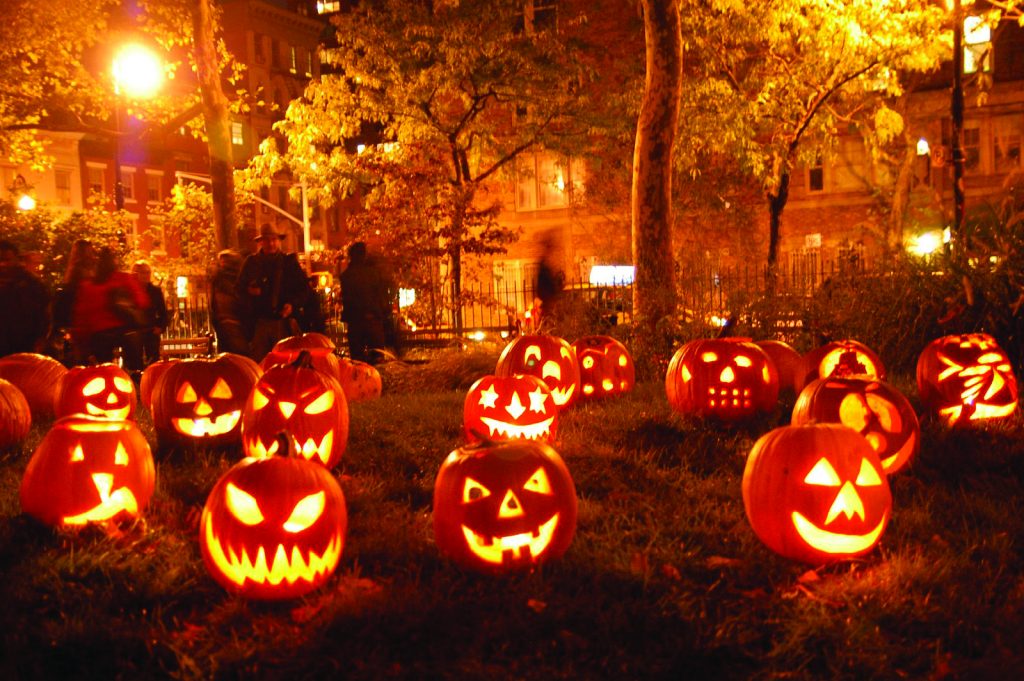31 Oct Homily – 31st Sunday in Ordinary Time

Love God with all your being and love your neighbor as yourself.
Seemingly it is so much easier to love God than it is to love one’s neighbor. Saint John in his first letter asks the question how do you love the God you do not see if you cannot love your neighbor whom you do see. So true witness to loving God is seeing our God in our neighbor and loving the God we see there.
Looking out our dining room window, I noticed the half dozen bright orange pumpkins spread throughout the garden. This is the Halloween weekend in secular society but it is really an ancient pagan celebration that was Christianized some centuries ago.
Ancient Celts marked Samhain as the most significant of their four quarterly fire festivals, taking place at the midpoint between the fall equinox and the winter solstice. It was their New Year. During this time of year, hearth fires in family homes were left to burn out while the harvest was gathered.
Because the Celts believed that the barrier between worlds was breakable during Sow wind, they prepared offerings that were left outside villages and fields for fairies, or migrating souls. It was expected that ancestors might cross over during this time as well, and Celts would dress as animals and monsters so that fairies were not tempted to kidnap them.
As the Middle Ages progressed, so did the celebrations of the fire festivals as large Bonfires. These developed into more personal Sow wind fires nearer the farms and, became a tradition, purportedly to protect families from fairies and witches. Eventually the fires were reduced to carved turnips called Jack-o-lanterns and began to appear, attached by strings to sticks and embedded with coal. Later Irish tradition switched to pumpkins.
As Christianity gained a foothold in pagan communities, church leaders attempted to reframe Samhain as a Christian celebration. In the 9th century, Pope Gregory moved the celebration of All Saints’ Day, to November 1. All Souls’ Day would follow on November 2. Neither new holiday did away with the pagan aspects of the celebration. October 31 became known as All Hallows Eve, or Halloween, and contained much of the traditional pagan practices before being adopted in 19th-century America through Irish immigrants bringing their traditions across the ocean.
Halloween is the night the spook is lose with souls migrating from a dark underworld to a bright, joyous place called heaven. These souls are our neighbors and even deceased family members. Among these neighbors we find the Beatitude people: the poor in Spirit, the mourning, the meek, the hungry and the thirsty for righteousness, the merciful, the pure of heart, the peacemakers, and the persecuted and the insulted, along with migrants, the refugees, and the socially marginalized. These are the neighbors in whom we are called to see God and to love.
Trick-or-treating is said to have been derived from ancient Irish and Scottish practices in the nights leading up to Samhain. In Ireland, mumming was the practice of putting on costumes, going door-to-door and singing songs to the dead. Cakes were given as payment.
Halloween pranks also have a tradition in Samhain, though in the ancient celebration, tricks were typically blamed on fairies.
For me All Saints and All Souls Days can be very personal. There are thousands, and I’d say maybe even millions of unnamed saints and this is the day we can honor our own saints. We have an expression: he or she was a living saint. I saw my mother that way, a living peacemaker, I know people who are quietly mourning a deceased spouse or child and a cemetery visit is healthy and helpful for them. I believe many to be saints. Have you met the merciful in life? I have. Their willingness to forgive despite remembering the hurts, the Gospel calls blessed or another word for Saints. Today the Celtic image has good and wonderful people entering the heavenly home through the thin veil separating this world from that other world of God.
And those who don’t enter or are delayed are immediately remembered on All Souls Day or the Day of the Dead in many Hispanic or Latin traditions. We have an altar of the dead or offrenda set up in our dining room, praying for family, for Servites who have served here and numberless parishioners of Assumption Church.
So Happy Feast Day for all the blessed ones that have been part of your life and you can name them and pray through them like so many other saints. They will never be canonized except by us and All Saints Day will be their feast and that’s why it is a favored feast of mine. So Halloween is not so secular but deeply religious if we see its true meaning as more than costumes and candy, a revelation of God’s love. Amen.
– Fr Michael Doyle, OSM



